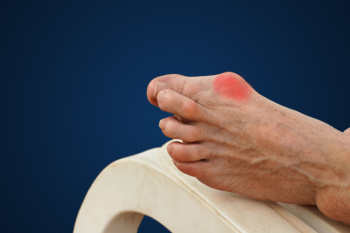 Bunions, medically known as hallux valgus, are bony bumps that form at the base of the big toe. They develop when the bones in the front part of the foot move out of place, while the tip of the big toe pulls toward the smaller toes. This forces the joint at the base of the big toe to stick out. Over time, the movement of the big toe toward the others creates a noticeable bump, which can become painful due to inflammation or arthritis within the joint. It may require treatment ranging from padded shoes and orthotics to surgery. Certain people are genetically predisposed to develop bunions, whereas other cases of bunions may develop due to ill-fitting footwear. High heels or shoes with a narrow toe box can exacerbate this condition. Additionally, conditions like arthritis can also contribute to bunion development by weakening and damaging the cartilage in the joint. If you have a bunion, it is suggested that you visit a podiatrist for treatment options and to prevent it from worsening.
Bunions, medically known as hallux valgus, are bony bumps that form at the base of the big toe. They develop when the bones in the front part of the foot move out of place, while the tip of the big toe pulls toward the smaller toes. This forces the joint at the base of the big toe to stick out. Over time, the movement of the big toe toward the others creates a noticeable bump, which can become painful due to inflammation or arthritis within the joint. It may require treatment ranging from padded shoes and orthotics to surgery. Certain people are genetically predisposed to develop bunions, whereas other cases of bunions may develop due to ill-fitting footwear. High heels or shoes with a narrow toe box can exacerbate this condition. Additionally, conditions like arthritis can also contribute to bunion development by weakening and damaging the cartilage in the joint. If you have a bunion, it is suggested that you visit a podiatrist for treatment options and to prevent it from worsening.
If you are suffering from bunions, contact David Lambarski, DPM of Northeast Foot Care. Our doctor can provide the care you need to keep you pain-free and on your feet.
What Is a Bunion?
A bunion is formed of swollen tissue or an enlargement of boney growth, usually located at the base joint of the toe that connects to the foot. The swelling occurs due to the bones in the big toe shifting inward, which impacts the other toes of the foot. This causes the area around the base of the big toe to become inflamed and painful.
Why Do Bunions Form?
Genetics – Susceptibility to bunions are often hereditary
Stress on the feet – Poorly fitted and uncomfortable footwear that places stress on feet, such as heels, can worsen existing bunions
How Are Bunions Diagnosed?
Doctors often perform two tests – blood tests and x-rays – when trying to diagnose bunions, especially in the early stages of development. Blood tests help determine if the foot pain is being caused by something else, such as arthritis, while x-rays provide a clear picture of your bone structure to your doctor.
How Are Bunions Treated?
- Refrain from wearing heels or similar shoes that cause discomfort
- Select wider shoes that can provide more comfort and reduce pain
- Anti-inflammatory and pain management drugs
- Orthotics or foot inserts
- Surgery
If you have any questions, please feel free to contact our offices located in Amsterdam and Clifton Park, NY . We offer the newest diagnostic and treatment technologies for all your foot care needs.
